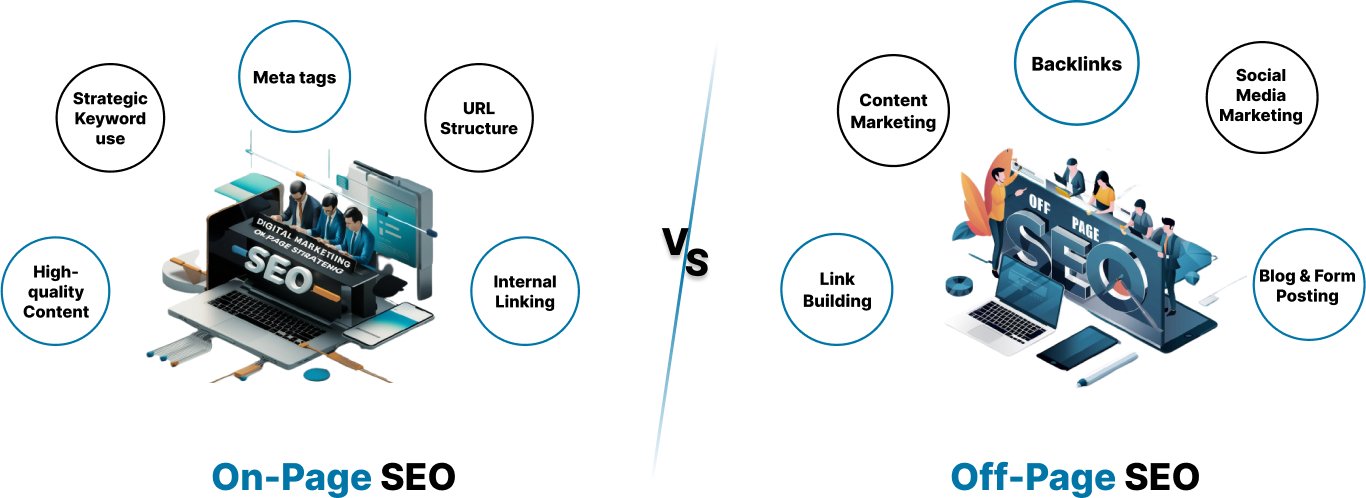

In today's digital age, SEO (Search Engine Optimization) is a critical aspect of digital marketing, playing a key role in enhancing a website's visibility on search engine results pages (SERPs) . By optimizing a website's presence online, SEO focuses on aligning with user intent and making content discoverable and understandable by search engine crawlers, thus embodying the core of what is SEO . As an integral component of digital marketing strategies, SEO not only increases a business's reach to potential customers but also augments overall marketing efforts, emphasizing the search engine optimization meaning . Additionally, recognizing the best SEO practices, such as the use of google search console, SEO marketing, and conducting competitor analysis, is pivotal for businesses aiming to leverage SEO effectively.
SEO's multifaceted approach, including keyword research, content marketing, on page SEO, off page SEO, and technical SEO, significantly contributes to a business's online authority, credibility, organic search rankings, and traffic. Moreover, it aids in surpassing competitors, maximizing ROI, and enhancing user experience, which is crucial for understanding what is SEO optimization . This introduction will not only delve into the nuances of SEO and its vital components like local SEO and SEO tools but also debunk common SEO myths, thereby offering a comprehensive insight into the powerful impact of SEO on business growth and elucidating the definition of SEO

Search Engine Optimization, commonly known as SEO, is the strategic process designed to increase a website's visibility in search engine results pages (SERPs). By optimizing content and website structure, SEO endeavors to attract higher quality and quantity of traffic through organic search results .

Search engines function by utilizing complex algorithms to discover, evaluate, and prioritize web pages. This process, essential for any SEO strategy, includes three primary activities: crawling, which is the discovery of content; indexing, where content is analyzed and stored in massive databases; and ranking, which orders search results by relevance to the user's query .

The primary aim of SEO is to enhance a website's searchability and visibility, which leads to increased organic traffic. Specific metrics used to measure SEO success include keyword rankings, organic traffic volume, user engagement rates, and overall SERP visibility. These efforts collectively boost brand awareness, establish online authority, and drive business growth by making the website more accessible to potential customers . SEO tools like Google Search Console and SEMRUSH play a crucial role in this process by providing insights that inform strategies and monitor performance .
Incorporating SEO into a company's digital marketing strategy ensures continuous improvement in reaching potential customers, standing out among competitors, and promoting products effectively online.
Keywords serve as the bridge between user queries and the relevant content they seek, making them foundational to effective SEO strategies . By carefully selecting and incorporating the right keywords, websites can significantly enhance their visibility and ranking on search engines. This process begins with keyword research, a critical step that involves understanding the terms and phrases potential visitors are searching for .

To optimize a website, it's essential to strategically place keywords across various elements such as the title, meta descriptions, body of the content, URLs, and even alt tags for images . This helps search engines understand the page's focus and relevance to specific queries, improving the likelihood of a higher ranking.

While keywords are crucial, their overuse, known as keyword stuffing, can harm a site's SEO performance. Search engines like Google penalize websites that excessively use keywords, viewing it as a manipulative tactic that degrades the user experience .

Incorporating long-tail keywords, which are more specific phrases, can attract more targeted traffic. These keywords often have a lower search volume but can lead to higher conversion rates as they align closely with user intent .
Effective keyword research not only aids in tailoring content to meet user needs but also provides insights into market trends, helping businesses stay competitive . Tools such as Moz's Keyword Explorer are invaluable for discovering a wide range of relevant keywords and gaining a deeper understanding of target audiences . Additionally, engaging with community forums can reveal the language and concerns of potential customers, further refining SEO strategies.
Recognizing and debunking common myths is also vital. Contrary to some beliefs, keyword research is essential for gathering valuable data like traffic volume and competitiveness of keywords, which are crucial for determining whether a keyword is worth targeting . Moreover, while targeting the right keywords is necessary, the quality of content remains a key factor in ranking, as search engines evaluate user engagement and satisfaction .
In conclusion, keywords are not just about SEO; they are about connecting with and understanding the audience. As search engines evolve, aligning content with user intent through meticulous keyword research and strategic placement remains a cornerstone of successful SEO practices.

On-page SEO: Creating high-quality content is essential for successful SEO. Strategic keyword use ensures that your content aligns with what users are searching for. Proper use of meta tags, including title tags and meta descriptions, enhances the visibility of your pages in search results. An optimized URL structure, featuring concise and relevant keywords, improves user experience and search engine readability. Additionally, effective internal linking not only helps distribute page authority but also guides visitors through your site, boosting engagement and retention.
Off-page SEO: Link building and content marketing are integral to boosting your website's visibility. By creating high-quality content and strategically acquiring backlinks, you can significantly improve your search engine rankings. Social media marketing amplifies this effort by sharing your content across platforms, driving traffic, and encouraging further backlinks. Additionally, regular blog and forum posting not only showcases your expertise but also fosters community engagement, leading to organic link-building opportunities. Combining these strategies ensures a comprehensive approach to online marketing, enhancing both your reach and authority.
Both on-page and off-page SEO are essential for a successful SEO strategy, each serving distinct but complementary roles. While on-page SEO ensures that a site is comprehensible and attractive to search engines, off-page SEO helps to establish the site's reputation and authority in the wider web community . Together, these strategies work to improve a site's visibility and ranking, which is critical for any business aiming to increase its online presence.
SEO has become a cornerstone in digital marketing strategies, significantly influencing business growth by enhancing online visibility and credibility. One of the primary benefits of SEO is the substantial increase in web traffic it can generate. Studies have shown that moving up just one spot in search results can increase click-through rates by an impressive 30.8% [24]. This surge in traffic is not just about numbers; it translates directly into greater visibility and potential sales, as SEO targets users who are actively searching for specific products and services, thereby increasing the likelihood of converting them into leads and customers .

Moreover, SEO plays a crucial role in building brand credibility. Ranking high on search engine results pages (SERPs) serves as an endorsement of trustworthiness and quality, signaling to users that the site is a reliable source of information or services [25][10]. This aspect is further supported by Google's EAT principles (Expertise, Authoritativeness, and Trustworthiness), which influence how well a website ranks based on the quality of content it provides to users, even if they do not make a purchase [22]. The impact extends beyond just user perception; high rankings also enhance a business's brand awareness, making it more recognizable and preferred among potential customers .
The strategic implementation of SEO not only improves site visibility but also enhances user experience, which is a critical factor in retaining visitors and converting them into customers. Optimizing a website involves improving site speed, ensuring mobile-friendliness, and making navigation intuitive, which collectively contribute to a more satisfying user experience . These improvements are vital as they help maintain high user engagement rates, reduce bounce rates, and ultimately, lead to higher conversion rates. Additionally, SEO is recognized for its cost-effectiveness, providing a high return on investment by attracting more organic traffic while keeping marketing expenses low . This makes SEO an invaluable strategy for businesses looking to grow sustainably in the competitive digital marketplace.
One prevalent misconception is that there is an ideal keyword density that will boost SEO rankings. Google has clarified that no such benchmark exists; rather, the focus should be on writing content that is natural and genuinely helpful to the reader .
Another common myth is the effectiveness of Latent Semantic Indexing (LSI) keywords in enhancing search rankings. Google has stated that it does not use LSI keywords for SEO. Instead, the emphasis is on the relevance and search intent behind the words used in content.
It's often believed that simply increasing the volume of content can improve SEO performance. However, the key is not quantity but the quality of content that meets the audience's needs and search intent. Producing content without a clear strategy does not necessarily benefit SEO and can lead to content saturation without adding value.
Focusing solely on high-volume keywords is a common strategy, but these keywords are usually highly competitive and less specific. Targeting lower-volume keywords can be more effective as they are less competitive and more targeted to specific niches, potentially yielding better conversion rates .
Many believe that domain authority is a direct ranking factor in SEO. While domain authority can provide insights into how a website compares to others, it is not a direct factor used by search engines for ranking websites. Tools like Semrush's Domain Overview can be helpful to check a site's authority score and compare it to competitors.
The myth that Google always penalizes websites for duplicate content is widespread. In reality, Google does not penalize for duplicate content unless it appears deceptive or manipulative. It's crucial to manage duplicate content wisely but not fear it as a penalty factor.
While long-form content has its advantages, such as covering a topic comprehensively, it does not automatically lead to better SEO performance. What matters more is how well the content aligns with what users are searching for—its relevance and ability to satisfy search intent .
There's a belief that having a sitemap will directly improve SEO rankings. Although sitemaps are crucial for helping search engines find and index pages, they do not guarantee higher rankings. They are, however, essential for larger sites or those with a significant number of archived pages that might be harder for search engines to discover organically .
To effectively measure the success of SEO efforts, it's essential to focus on a variety of metrics that reflect different aspects of a website's performance. Here are some key indicators:

Monitoring the number of visitors who find your site via search engines is crucial. An increase in organic traffic suggests that SEO strategies are improving your site's visibility .
Regularly check where your pages rank in SERPs for targeted keywords. This metric helps gauge the effectiveness of your SEO and content strategies .

CTR measures the percentage of users who click on your site after seeing it in search results. A higher CTR indicates that your title tags and meta descriptions are compelling and relevant

Analyzing how many visitors leave your site without interaction can offer insights into user engagement and content relevance. A lower bounce rate generally signifies more engaging and effective content .

The number and quality of backlinks are indicators of your website's authority and trustworthiness. Tracking new and lost backlinks can help assess the health of your SEO off-page activities.

Metrics like average time on page and pages per session provide insights into how well your content resonates with your audience. These are crucial for understanding user engagement and satisfaction.

Ultimately, the goal of SEO is not just to attract more traffic but to convert that traffic into leads and customers. Monitoring conversion rates helps evaluate the ROI of your SEO efforts .
By regularly tracking these metrics using tools like Google Analytics 4 and Google Search Console, businesses can gain valuable insights into their SEO performance and make data-driven decisions to enhance their strategies [28]. Additionally, SEO audits using tools such as Lighthouse and PageSpeed Insights can identify technical improvements that further optimize SEO efforts . Regular updates and adjustments based on these analytics are essential for maintaining and improving SEO results, ensuring long-term success in a competitive digital landscape

Search Engine Optimization (SEO) is crucial for digital marketers as it enhances the visibility, credibility, and user experience of websites. This, in turn, boosts traffic, builds customer trust, and contributes to the long term success of a business
Search Engine Optimization (SEO) is crucial for digital marketers as it enhances the visibility, credibility, and user experience of websites. This, in turn, boosts traffic, builds customer trust, and contributes to the long term success of a business.
Search plays a pivotal role in digital marketing through paid search advertising. This method involves placing sponsored ads on search engines to attract potential customers, thereby increasing website traffic. Paid search is effective as it covers all major search engines, including Google, Bing, and Yahoo.
SEO is vital for boosting digital marketing performance by optimizing the content, structure, and on site elements of a website. This optimization enhances visibility and user experience, leading to more organic traffic, higher engagement, and improved conversion rates.

